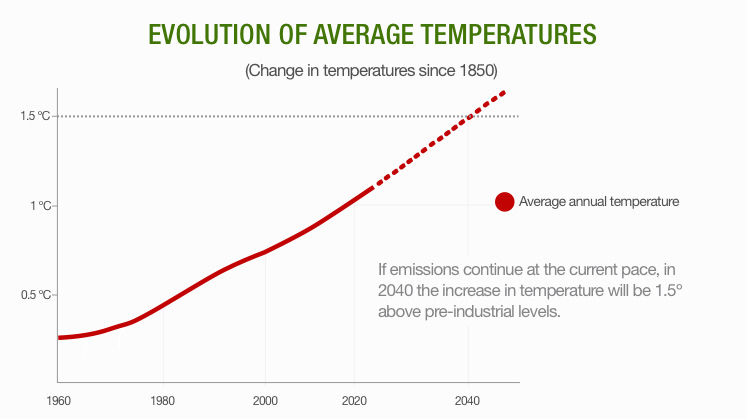How to fight against global warming
We share the need to move towards a 1.5º C scenario with robust policies
The historic Paris Agreement, adopted by 195 nations during COP21 (2015), included the goal of strengthening the world's response to the threat of climate change and, in order to do so, to keep the increase in the average temperature worldwide well below 2º C above pre-industrial levels and to continue efforts to limit this temperature increase to 1.5º C. A new report published by the Intergovernmental Panel on Climate Change (IPCC) has reaffirmed the urgent need to move towards a scenario of 1.5º C.



IPCC and the impacts of global warming
The Intergovernmental Panel on Climate Change (IPCC) was created in 1988 and is now the top international body responsible for evaluating the scientific knowledge on climate change, its impacts and risks, and the possible options for responding to it.
With the approval of the Paris Agreement, the IPCC was invited in 2018 to draw up a special report on the impacts of global warming of 1.5º C above pre-industrial levels and related global greenhouse gas (GHG) emission pathways. The IPCC accepted this invitation and the final report External link, opens in new window. was published on 8 October.
External link, opens in new window. was published on 8 October.

The Iberdrola Group, standing with the IPCC's vision
Iberdrola wishes to contribute actively and decisively to a sustainable and low-carbon future, an effort that will also drive forward social and economic development through the creation of employment and wealth. A worldwide benchmark in the fight against climate change, we are currently at the top of the international sustainability indices.
For Iberdrola, the publication of the report Global Warming of 1.5º C acts as a basic and substantial component in successfully consolidating the policy stage of the Talanoa Dialogue at the Climate Summit in Katowice in December 2018, known as COP24.
We share the IPCC's vision of the need to move towards a 1.5º C scenario, its feasibility and the associated opportunities in terms of improvements in economic growth, industrial development, air quality and public health. We therefore seek to highlight the urgency of acting to reach a peak in emissions as soon as possible and a path towards reducing emissions that ensures that the increase in temperature by the end of the century is significantly below 2º C.
The report points out that to limit global warming to 1.5º C "rapid, wide-ranging" changes would be needed to the earth, energy, industry, buildings, transportation and cities. Iberdrola believes that all sectors (transport, construction, industry, etc.) must accelerate their transition to decarbonisation in order to fulfil this scenario. We therefore share the IPCC's view of the important role of the energy sector and, in particular, electricity as being the main way to decarbonise the end uses of energy in transport, construction and industry.
"The electricity sector is the sector that offers greater advantages for efficiently advancing the decarbonisation process"
Ignacio Galán, Chairman of Iberdrola
However, we believe that it is appropriate to take into account the great uncertainty associated with the role of CO2 capture technologies: the report assigns them a very important role and the large-scale effectiveness of these techniques has not been proven.
Iberdrola also strongly supports the development of long-term climate strategies to achieve zero net emission economies and robust climate policy frameworks in which:
- Taxation and carbon pricing instruments based on the "polluter pays principle" play a central role.
- The priorities are energy efficiency, achieved mainly through the electrification of end uses (electric transport, heat pumps, LEDs) and the development of renewable energies.
- Sectoral policies and plans help to successfully overcome existing barriers to decarbonisation.
However, we consider that short-term actions must take priority, given the seriousness of the problem and its increasing pace, and the fact that the process must take place as part of a fair transition that includes support for the most vulnerable sections of society.




